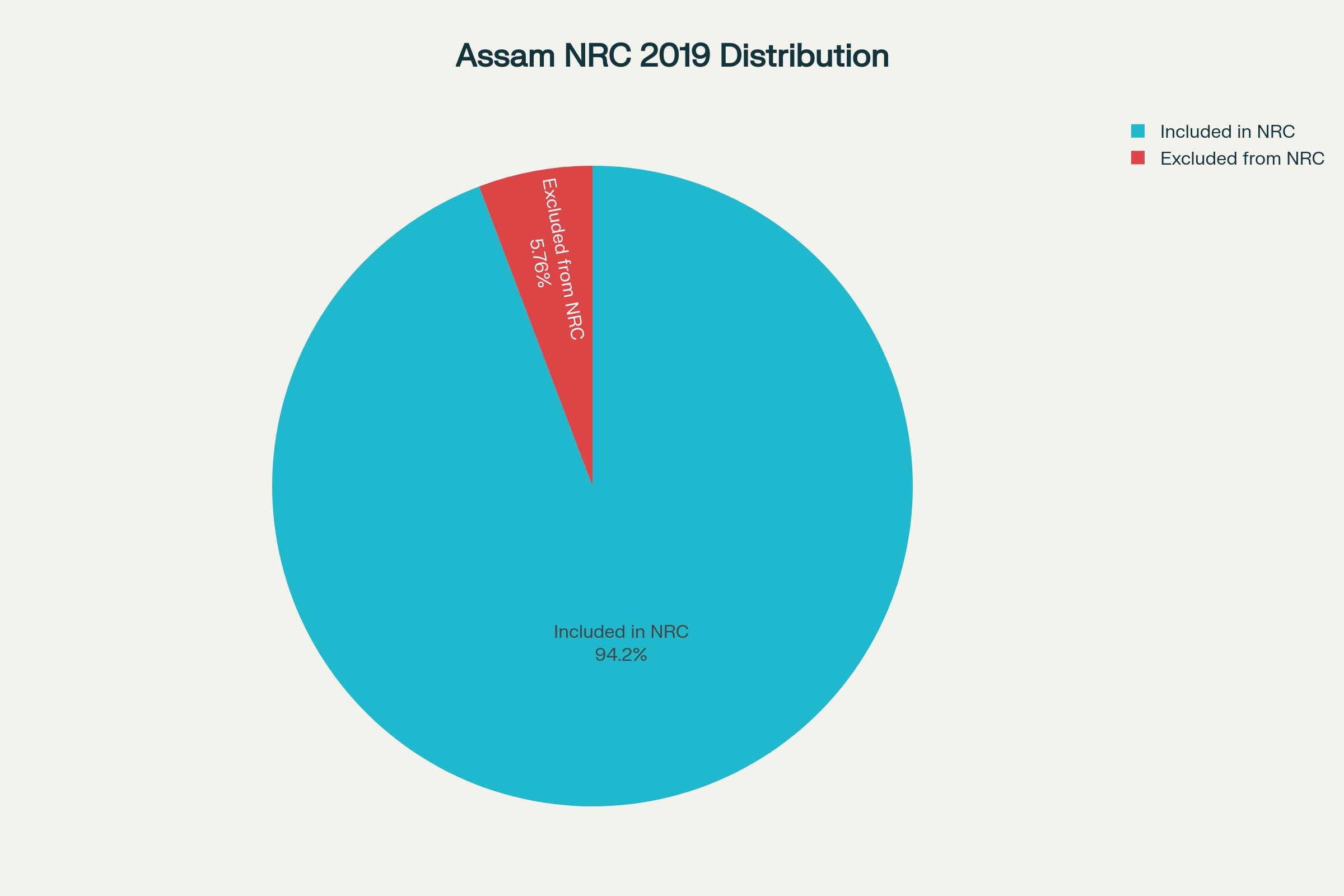Key Highlights:
- Union Ministry empowers Foreigners Tribunals to directly order detention of suspected illegal immigrants through executive powers
- New Immigration and Foreigners Order 2025 replaces 1964 legislation, granting first-class magistrate authority to Foreigners Tribunals
- Order becomes effective immediately across India under newly implemented Immigration and Foreigners Act 2025
Initial Framework Overhaul Strengthens Immigration Control
The Union Ministry of Home Affairs has significantly strengthened India’s immigration enforcement mechanism by granting Foreigners Tribunals the authority to directly order detention of suspected illegal immigrants. This pivotal change, implemented through the Immigration and Foreigners Order 2025, marks a fundamental shift in how India handles citizenship verification and immigration control.
Previously, the authority could only determine citizenship status, with actual detention requiring separate executive orders from district magistrates or police authorities. The new framework eliminates this bureaucratic delay, enabling Foreigners Tribunals to immediately initiate detention procedures against individuals declared as illegal immigrants. This streamlined approach addresses long-standing concerns about suspected foreigners disappearing during the gap between Foreigners Tribunals decisions and detention orders.
The Immigration and Foreigners Order 2025 officially came into effect on September 1, 2025, alongside the comprehensive Immigration and Foreigners Act 2025. This legislative overhaul consolidates four pre-independence era laws, including the Foreigners Act of 1946 and the Passport (Entry into India) Act of 1920, creating a unified modern framework for immigration control.
New MHA Order- Foreigners Tribunals, so far unique to Assam, can issue arrest warrants,send those who can’t prove they are “not a foreigner”to detention centres; Foreigners barred from private jobs in the defence, nuclear and human rights etc. I ✍️ https://t.co/lZoOklx4Bk
— Vijaita Singh (@vijaita) September 3, 2025
Enhanced Judicial Powers Transform Foreigners Tribunals Authority
The 2025 order grants Foreigners Tribunals the powers of both civil courts and first-class judicial magistrates, fundamentally expanding their operational scope beyond previous limitations. These enhanced powers include summoning and examining individuals under oath, requiring document discovery and production, issuing examination commissions for witnesses, directing personal appearances, and issuing arrest warrants against non-compliant individuals.
- Streamlined enforcement: Foreigners Tribunals now possess direct detention authority eliminating bureaucratic delays between tribunal decisions and enforcement actions
- Expanded judicial capacity: Foreigners Tribunals now possess civil court powers under the Code of Civil Procedure 1908 and magistrate authority under the Bharatiya Nagarik Suraksha Sahita 2023
The enhanced framework specifically addresses cases where individuals fail to provide proof of non-foreigner status or fail to appear before Foreigners Tribunals. Previously, such situations required lengthy executive processes, often allowing suspected illegal immigrants to evade detection. Under the new system, Foreigners Tribunals can immediately issue detention orders and arrest warrants, significantly improving enforcement efficiency.
Assam-Centric Implementation Reflects Regional Immigration Challenges
While the Immigration and Foreigners Order 2025 applies nationwide, Foreigners Tribunals currently operate exclusively in Assam, where approximately 100 such Foreigners Tribunals handle citizenship verification cases. This concentrated deployment reflects Assam’s unique position as India’s primary frontier for addressing undocumented migration, particularly from Bangladesh.
The expansion of Foreigners Tribunals powers directly connects to Assam’s National Register of Citizens (NRC) update, completed in 2019, which excluded 1.9 million applicants from a total population of 32.9 million. Many excluded individuals subsequently appeared before Foreigners Tribunals to contest their exclusion, creating substantial caseloads that required more efficient processing mechanisms from Foreigners Tribunals.

Assam’s Foreigners Tribunals system evolved from 11 Illegal Migrant Determination Tribunals established after the Supreme Court struck down the Illegal Migrants (Determination by Tribunals) Act in 2005. The current network of 100 Foreigners Tribunals represents a ten-fold expansion designed to handle increased workloads following the NRC publication and subsequent appeals to Foreigners Tribunals.
Broader Immigration Framework Introduces Stricter Penalties
The Immigration and Foreigners Act 2025 introduces significantly harsher penalties for immigration violations, particularly targeting document fraud and illegal entry. Individuals using forged passports or visas face prison terms ranging from two to seven years, accompanied by fines between ₹1 lakh and ₹10 lakh. These penalties represent a substantial increase from previous legislation, reflecting the government’s commitment to deterring immigration fraud.
The Act mandates comprehensive reporting requirements for hotels, universities, hospitals, and other institutions, requiring them to provide foreigner information to authorities for tracking overstaying individuals. Airlines, shipping companies, and international carriers must share advance passenger and crew details with immigration officers at entry points, creating a comprehensive monitoring system for foreign nationals.
- Employment restrictions: Private sector companies in power, water, petroleum, defense, space technology, nuclear energy, and human rights sectors cannot employ foreigners without central government approval
- Border security enhancement: Border Guarding Forces and Coast Guard receive explicit authority to prevent illegal entry and capture biometric information from attempted border crossers
Official Statistics and Implementation Data
| Metric | Value |
|---|---|
| Foreigners Tribunals operational in Assam | 100 |
| Total population in Assam (2019) | 32,900,000 |
| Applicants excluded from Assam NRC (2019) | 1,900,000 |
| Minimum jail term for forged passport (years) | 2 |
| Maximum jail term for forged passport (years) | 7 |
| Minimum fine for forged passport (INR) | ₹100,000 |
| Maximum fine for forged passport (INR) | ₹1,000,000 |
| Cost of NRC update (crores INR) | ₹1,602.66 crore |
Strategic Implications for National Immigration Policy
The empowerment of Foreigners Tribunals represents a calculated response to India’s evolving immigration challenges, particularly along the Bangladesh border where undocumented migration has created complex demographic and security concerns. By consolidating judicial and executive powers within Foreigners Tribunals frameworks, the government aims to create more efficient pathways for citizenship verification and illegal immigrant detention.
The Immigration and Foreigners Order 2025 specifically exempts Nepalese, Bhutanese citizens, and Tibetans, Sri Lankan Tamils from its provisions, maintaining India’s traditional accommodation of regional migration patterns while tightening controls on other foreign nationals. This selective approach reflects diplomatic considerations and historical migration agreements that predate current immigration concerns.
The new framework’s effectiveness will largely depend on implementation capacity and coordination between central authorities, state governments, and judicial systems. While Assam currently hosts all operational Foreigners Tribunals, the nationwide applicability of the 2025 order suggests potential expansion to other states facing significant immigration challenges, particularly along India’s extensive land borders with Pakistan, Bangladesh, and Myanmar.


